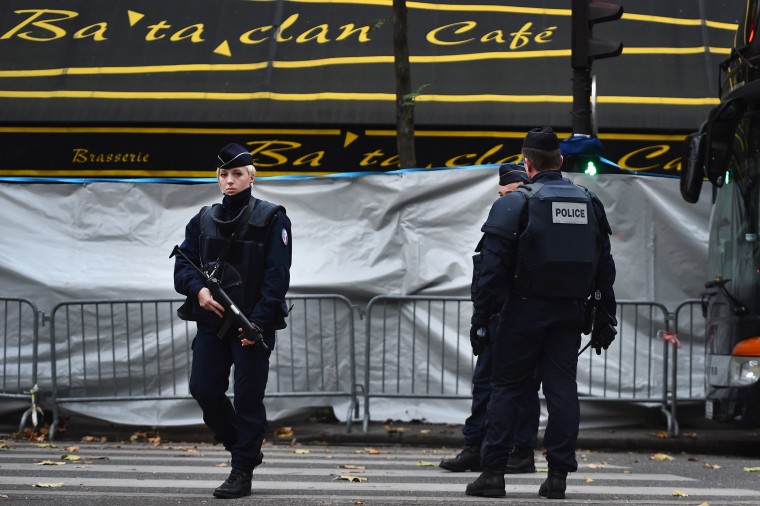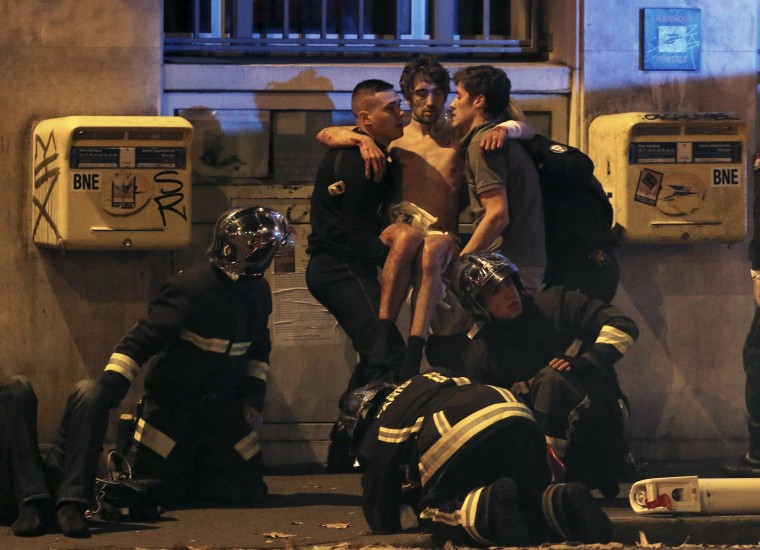Despite a history of extremist threats to the Bataclan concert hall, the venue’s owners were not warned or given any police protection, according to a French parliamentary report released Tuesday that calls for an overhaul of the way that country fights terrorism.
The Bataclan was the scene of a mass slaughter during the November 13 terrorist attacks in Paris. ISIS militants shot and bombed patrons attending a performance by an American band, killing 90 people.
NBC News published an exclusive report Tuesday based on a review of thousands of French and Belgian documents that examined a previous threat to the Bataclan, allegedly made by Farouk Ben Abbes, a Belgian of Tunisian origin who was investigated but never charged in a 2009 terror attack in Cairo that killed a French teenager.
Click Here to Read the Exclusive Report on the Paris Files
The parliamentary report delves into that episode, while quoting French intelligence officials defending the decision not to protect the Bataclan. Families of the victims in the 2009 case have long criticized its handling by French authorities.
One of the suspects in the Cairo case, a French woman of Albanian descent named Dude Hoxha, told authorities that she learned in 2010 that Ben Abbes wanted to attack the Bataclan because its owners were Jewish and held “events and fundraisers for the Jewish community.”
Ben Abbes also confessed to the plot while in Egyptian custody, according to the parliamentary report and to intelligence documents reviewed by NBC News. His claim to have been tortured, and the refusal by Egypt to cooperate in a French/Belgian investigation, set back efforts to investigate the matter, the report says.
Patrick Calvar, the director of France’s internal security service, told the committee that Ben Abbes had been arrested in Belgium in the mid 2000s, suspected of helping funnel insurgent fighters to Iraq.
His case was dismissed, and he went to Egypt in 2009, where he told his father in an email he wanted to engage in “armed jihad.”
After his arrest in Egypt following the Cairo bombing, he was sent to Belgium, and then France. But investigators failed to verify the existence of a Bataclan plot or make any other terrorism charge against him stick, and he was released.
A French prosecutor, François Molins, told the parliamentary investigation that the case was undermined by lack of cooperation from the Egyptians.
After the case was dropped, he said, there was no reason to protect or warn the Bataclan.
Separately, in 2008, a group of masked Islamic extremists filmed a video threatening to attack the Bataclan. It’s not known if that threat was connected to Ben Abbes, but it underscored the extent to which the concert hall was long considered a ripe target in French jihadi circles.

The report also confirms that French authorities were aware last summer that ISIS was planning an attack against an unspecified concert hall.
On August 15, 2015 a young Frenchman, Reda Hame, was arrested by French authorities on his way back from Syria, the report says
Hame told prosecutors about a plan to attack a rock concert hall, though the Bataclan was not cited specifically.
The report raised questions about whether authorities should have linked the 2015 threat with the older one, but the report is equivocal about that.
"Would it have been nevertheless possible to make a link between the 2015 threat," asks the report, "and the supposed but precise threat of 2009? This would require that the magistrates and intelligence services individually kept in their memory every target mentioned by [all] terrorists during their questioning."
NBC News reported Tuesday that despite significant evidence, the joint French and Belgian task force investigating the Cairo attack appears to have spun its wheels from 2009 to 2012 in a plodding and ultimately feckless attempt to penetrate what they believed to be a terror cell in France and Belgium.
The Cairo group had extensive links to key figures in the later attacks on Paris and Brussels, the documents show. In fact, terrorism experts say, they were all members of the same sprawling network, a group of European jihadists who gravitated from al Qaeda to ISIS as the latter group grew in prominence.
Ben Abbes and Hoxha, for example, were close associates of Fabien Clain, who recorded a video claiming credit for the Paris attacks on behalf of ISIS. He is now in Syria.
"If they had done their jobs properly, if they had arrested these people, I truly believe that the November 13 attack would have not taken place," said Catherine Vannier, whose daughter, Cecille, 17, was killed in Cairo.
The French report calls for longer prison sentences in terrorism cases, a new effort against prison radicalization, and greater cooperation among French and international counterterrorism agencies.
The report also calls for the creation of a U.S.-style counterterrorism agency to act as a clearinghouse for intelligence.


